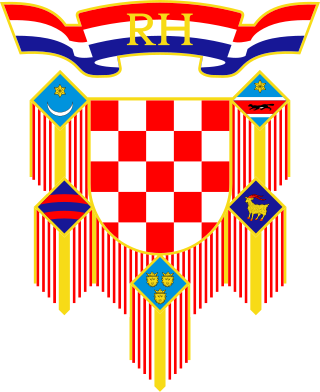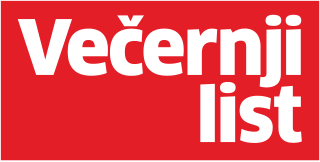See also
| Sovereign states |
|
|---|---|
| States with limited recognition | |
| Dependencies and other entities | |
Fauna of Croatia may refer to:

Croatia, officially the Republic of Croatia, is a country located at the crossroads of Central and Southeast Europe. Its coast lies entirely on the Adriatic Sea. Croatia borders Slovenia to the northwest, Hungary to the northeast, Serbia to the east, Bosnia and Herzegovina and Montenegro to the southeast, and shares a maritime border with Italy to the west. Its capital and largest city, Zagreb, forms one of the country's primary subdivisions, with twenty counties. Other major urban centers include Split, Rijeka and Osijek. The country spans 56,594 square kilometres, and has a population of nearly 3.9 million.

Serbo-Croatian – also called Serbo-Croat, Serbo-Croat-Bosnian (SCB), Bosnian-Croatian-Serbian (BCS), and Bosnian-Croatian-Montenegrin-Serbian (BCMS) – is a South Slavic language and the primary language of Serbia, Croatia, Bosnia and Herzegovina, and Montenegro. It is a pluricentric language with four mutually intelligible standard varieties, namely Serbian, Croatian, Bosnian, and Montenegrin.
The Ustaše, also known by anglicised versions Ustasha or Ustashe, was a Croatian, fascist and ultranationalist organization active, as one organization, between 1929 and 1945, formally known as the Ustaša – Croatian Revolutionary Movement. From its inception and before the Second World War, the organization engaged in a series of terrorist activities against the Kingdom of Yugoslavia, including collaborating with IMRO to assassinate King Alexander I of Yugoslavia in 1934. During World War II in Yugoslavia, the Ustaše went on to perpetrate the Holocaust and genocide against its Jewish, Serb and Roma populations, killing hundreds of thousands of Serbs, Jews, Roma, as well as Bosniak Muslim and Croat political dissidents.

The president of Croatia, officially the president of the Republic of Croatia, is the head of state, commander-in-chief of the military and chief representative of the Republic of Croatia both within the country and abroad. The president is the holder of the highest office in Croatia. However, the president is not the head of the executive branch as Croatia has a parliamentary system in which the holder of the post of prime minister is the most powerful person within the country's constitutional framework and everyday politics.

The prime minister of Croatia, officially the president of the government of the Republic of Croatia, is Croatia's head of government, and is de facto the most powerful and influential state officeholder in the Croatian system of government. Following the first-time establishment of the office in 1945, the 1990–2000 semi-presidential period is the only exception where the president of Croatia held de facto executive authority. In the formal Croatian order of precedence, however, the position of prime minister is the third highest state office, after the president of the Republic and the speaker of the Parliament.

The Croatian Parliament or the Sabor is the unicameral legislature of Croatia. Under the terms of the Croatian Constitution, the Sabor represents the people and is vested with legislative power. The Sabor is composed of 151 members elected to a four-year term on the basis of direct, universal and equal suffrage by secret ballot. Seats are allocated according to the Croatian Parliament electoral districts: 140 members of the parliament are elected in multi-seat constituencies. An additional three seats are reserved for the diaspora and Croats in Bosnia and Herzegovina, while national minorities have eight places reserved in parliament. The Sabor is presided over by a Speaker, who is assisted by at least one deputy speaker.

The Croatia national football team represents Croatia in international football matches. It is governed by the Croatian Football Federation (HNS), the governing body for football in Croatia. It is a member of UEFA in Europe and FIFA in global competitions. The team's colours reference two national symbols: the Croatian checkerboard and the country's tricolour. They are colloquially referred to as the Vatreni (Blazers) and Kockasti.
Regular elections in Croatia are mandated by the Constitution and legislation enacted by Parliament. The presidency, Parliament, county prefects and assemblies, city and town mayors, and city and municipal councils are all elective offices. Since 1990, seven presidential elections have been held. During the same period, ten parliamentary elections were also held. In addition, there were nine nationwide local elections. Croatia has also held three elections to elect members of the European Parliament following its accession to the EU on 1 July 2013.

The Croatian Football Federation is the national governing body of football in Croatia. It was originally formed in 1912 and is based in the capital city of Zagreb. The organisation is a member of both FIFA and UEFA, and is responsible for overseeing all aspects of the game of football in Croatia. The current president of HNS is Marijan Kustić.
The Hrvatska nogometna liga, abbreviated as HNL and also known for sponsorship reasons as the SuperSport HNL, is the top Croatian professional football league competition, established in 1992. It was previously called Prva Hrvatska nogometna liga, but a league structure reorganization from 2022–23 led to name changes for the three top league levels.

Jutarnji list is a Croatian daily newspaper, founded and continuously published in Zagreb since 6 April 1998, by EPH which eventually changed name in Hanza Media, when bought by Marijan Hanžeković. The newspaper is published in the berliner format and online. Its online edition jutarnji.hr is the second most visited news website in Croatia after Index.hr.

Večernji list is a Croatian daily newspaper published in Zagreb.

Luka Modrić is a Croatian professional footballer who plays as a midfielder for La Liga club Real Madrid and captains the Croatia national team. He plays mainly as a central midfielder, but can also play as an attacking midfielder or as a defensive midfielder. He is widely regarded as one of the greatest midfielders of all time, and as the greatest Croatian footballer ever.

Croatia has participated in the Eurovision Song Contest 29 times since making its debut at the 1993 contest. The country's entry has, since 1993 and excluding from 2012 to 2018, been selected at the Dora festival, an event organised by the national public broadcaster Hrvatska radiotelevizija (HRT). Croatia's best result in the contest is a second-place finish in 2024.

Croatian is the standardised variety of the Serbo-Croatian pluricentric language mainly used by Croats. It is the national official language and literary standard of Croatia, one of the official languages of Bosnia and Herzegovina, Montenegro, the Serbian province of Vojvodina, the European Union and a recognized minority language elsewhere in Serbia and other neighbouring countries.

Građanski nogometni klub Dinamo Zagreb, commonly referred to as GNK Dinamo Zagreb or simply Dinamo Zagreb, is a Croatian professional football club based in Zagreb. Dinamo play their home matches at Stadion Maksimir. They are the most successful club in Croatian football, having won twenty-five Prva HNL titles, sixteen Croatian Cups, еight Croatian Super Cups, and one Inter-Cities Fairs Cup. The club has spent its entire existence in top flight, having been members of the Yugoslav First League from 1946 to 1991, and then the Prva HNL since its foundation in 1993.
The COVID-19 pandemic in Croatia has resulted in 1,316,958 confirmed cases of COVID-19 and 18,752 deaths.
This article documents the timeline of the COVID-19 pandemic in Croatia.